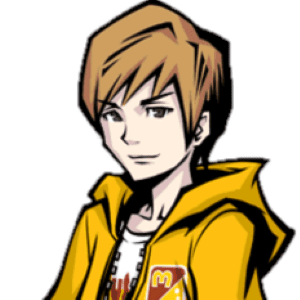After my review of The Great Ace Attorney Chronicles was released I hadn’t thought I would be talking about another courtroom visual novel any time soon, but at this point I just couldn’t help myself. When I receive a copy of the game from my brother for Christmas AND it’s a game I’ve had on my wishlist since college, I’m going to want to review it. Take a moment to preen your feathers everyone, things are about to get wacky.
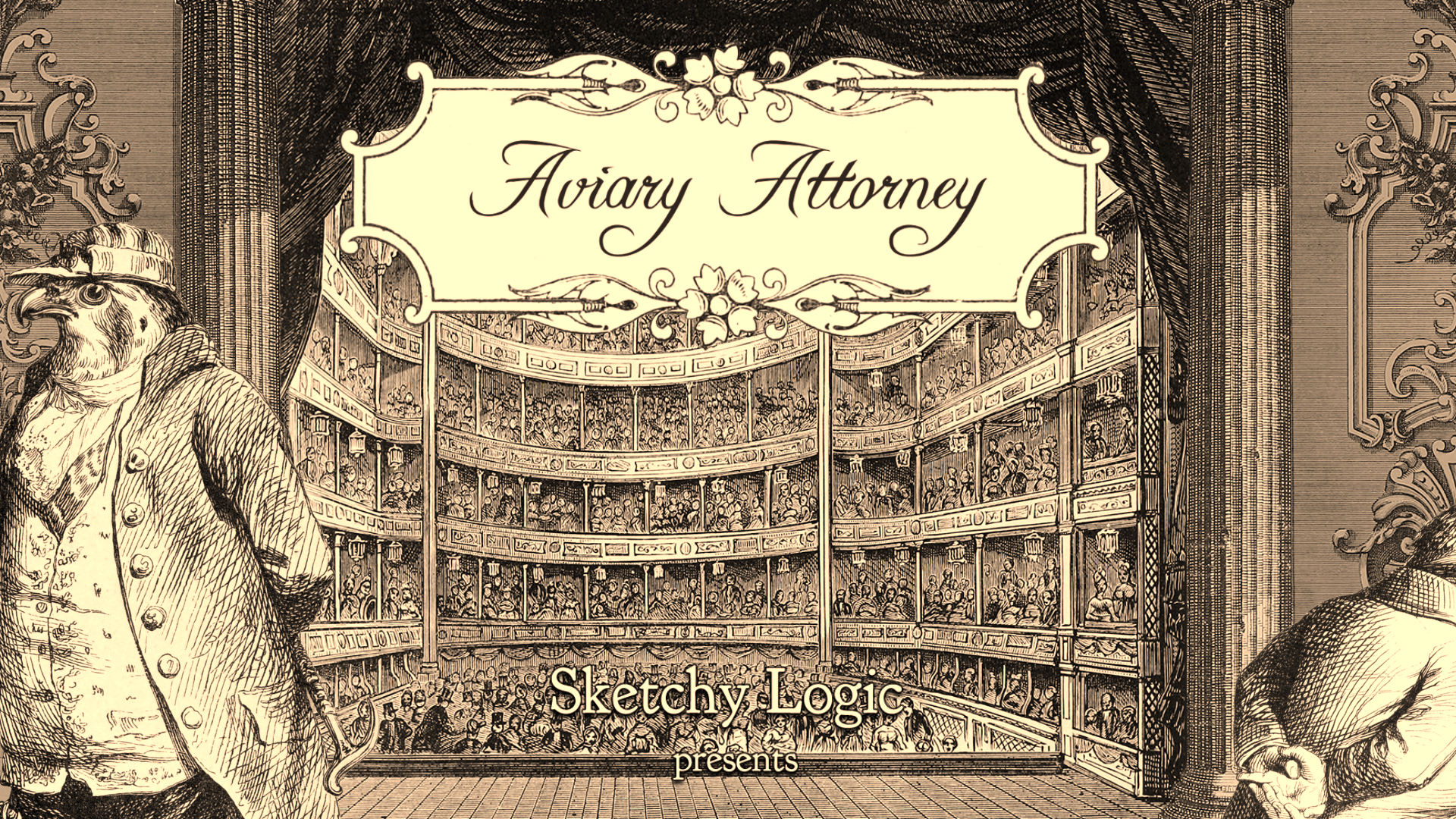
Developed and published by Sketchy Logic and released in 2015, Aviary Attorney is a surreal comedy adventure visual novel available on PC; an updated version on Nintendo Switch released in 2020. The game’s premise involves an anthropomorphized take on 1840’s France, and a tale of legal mystery following a defense team during the transition from the July Monarchy to the Second Republic. Players engage with the game by reading a lot of text, exploring environments to collect information and evidence, making time-sensitive decisions, and uncovering contradictions to move the story forward. Please note that the Steam version was used for this review. The Nintendo Switch version is technically a definitive edition which to my knowledge includes some bonus features and sharper graphics, but no story changes so I’m assuming this review will roughly apply to both versions.
The story of Aviary Attorney takes place in Paris, France and follows the tale of Jayjay Falcon, a lawyer of questionable repute, as he takes on a variety of legal cases which pass over the desk of the Aviary Attorney Offices. The historical backdrop of the game naturally lends the game to a fictional account of how the revolution which leads to the Second Republic started, though this is an element of the story which comes more into focus as the game progresses. The true heart of this story is Jayjay Falcon himself, because though the revolution is inevitable, his actions have a profound impact on the context of the revolution. Much time is also dedicated to exploring his relationships to his coworkers such as the loveable assistant Sparrowson.
This leads me to the core of what makes Aviary Attorney so good as a story: its “choices-matter” approach to storytelling. Make no mistake, Aviary Attorney is a short gaming experience, but this limitation works in its favor. The first two chapters of the game flesh out Falcon through dialogue choices however you wish, and the third chapter provides a tough mystery to solve which can lead to one of the game’s three endings based on your choices and competence alike. While it is possible to put yourself down an ending route which contradicts your characterization just a little, overall the game’s endings respect the way each player engages with Aviary Attorney’s world. You’ll want to engage with that world too; the dialogue in this game is full of sharp wit, memorable characters, and a few tongue and cheek nods to Shu Takumi’s ever popular brainchild. I do want to avoid giving out too much information in the story section because the short runtime leaves me with many things I want the players to experience for themselves, but know that I found the game’s narrative thoroughly enjoyable.
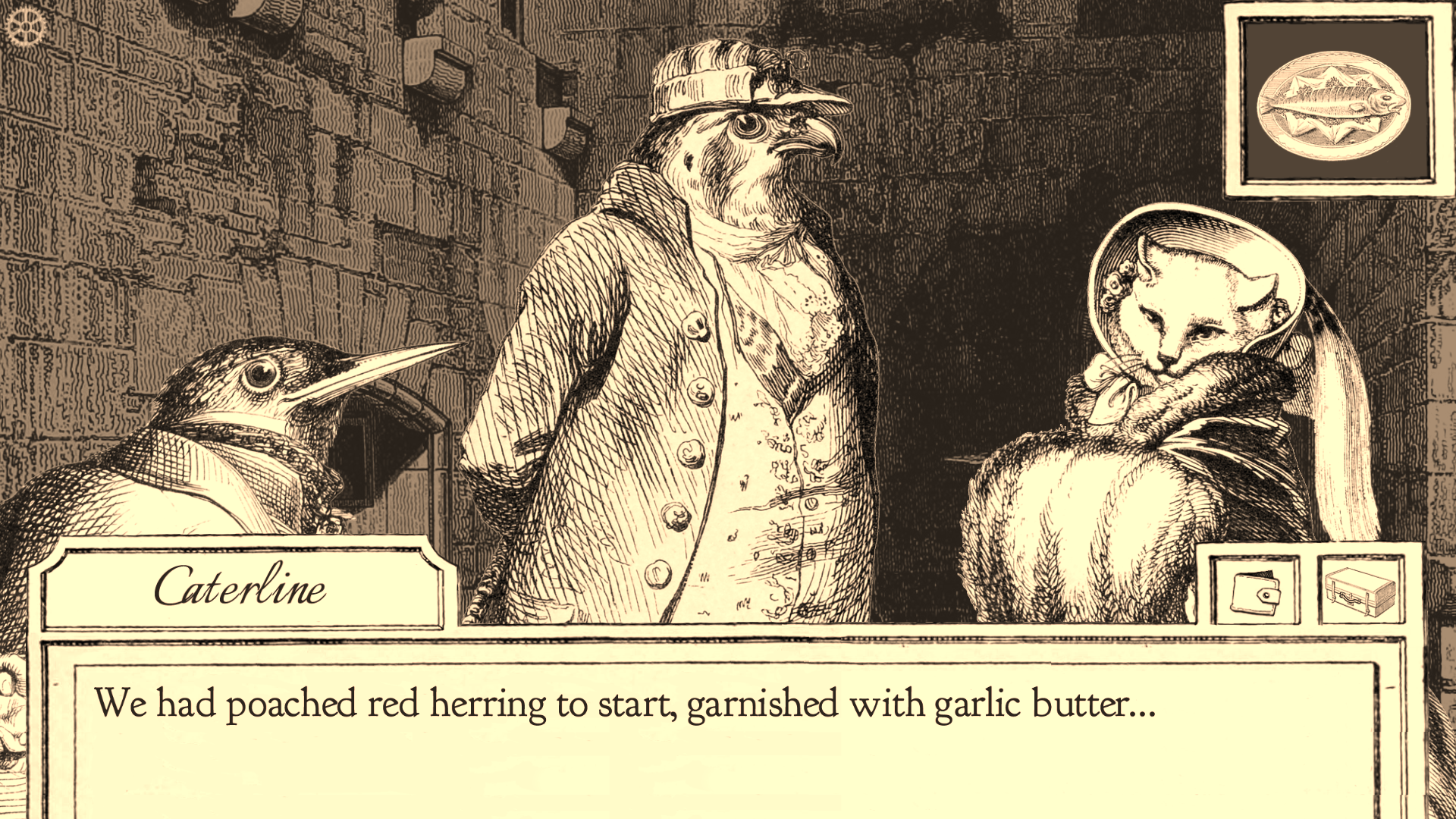
Gameplay wise, Aviary Attorney borrows a lot of ideas from Capcom’s Ace Attorney series, but it manages to cleverly twist many of these ideas in ways that give it its own identity. The first chapter plays the formula relatively straight, but the bombshell plot twist at the end of it signals loud and clear that this isn’t going to be a mere tribute game. By Chapter Two things really start to branch out. Starting with the game’s handling of exploration, collecting evidence in the environment is a simple enough object finder affair, but everything else is quite unique. Talking to witnesses and other townsfolk can often be affected by the way you chose to phrase your intentions, leading to some hilarious results if you’re unable to read the room. More importantly is the time management side of investigation, which is the most challenging and rewarding part of the game. Each location you visit passes a day’s worth of time, so you’re encouraged to pick your destinations wisely and scour each area thoroughly to save yourself a repeat trip. Wrong choices can genuinely leave you deprived of evidence you need to secure a not guilty verdict, and this makes investigation tense and engaging throughout the story.
The trial sections also share the same basic structure as Ace Attorney, but time is once again not on your side. Falcon’s main role is to cross examine and contradict the witness on the stand, but badgering the witness about details which aren’t going to go anywhere lowers your favor with the jury watching the proceedings. This means that the player is also incentivised to choose where to strike fast and hard, and adds a bit of realism to a mechanic which players historically dragged out to see all of the optional dialogue. On the whole, Aviary Attorney’s moment to moment gameplay may still mostly be reading, but the parts that are playable provoke more realistic reactions from the narrative that arguably makes it more engaging that the series that inspired it. The only real sore spot for me regarding gameplay is the final chapters, as out of the three endings only the C route had any genuine feeling of not being on rails (if only slightly). Endings A and especially B feel surprisingly light on any sense that I could deviate from the intended path by comparison. The B route was probably intended to act as a reward for solving the difficult third chapter mystery, but overall I think both it and ending A could have benefited from more of the tension which made the previous chapters so good.
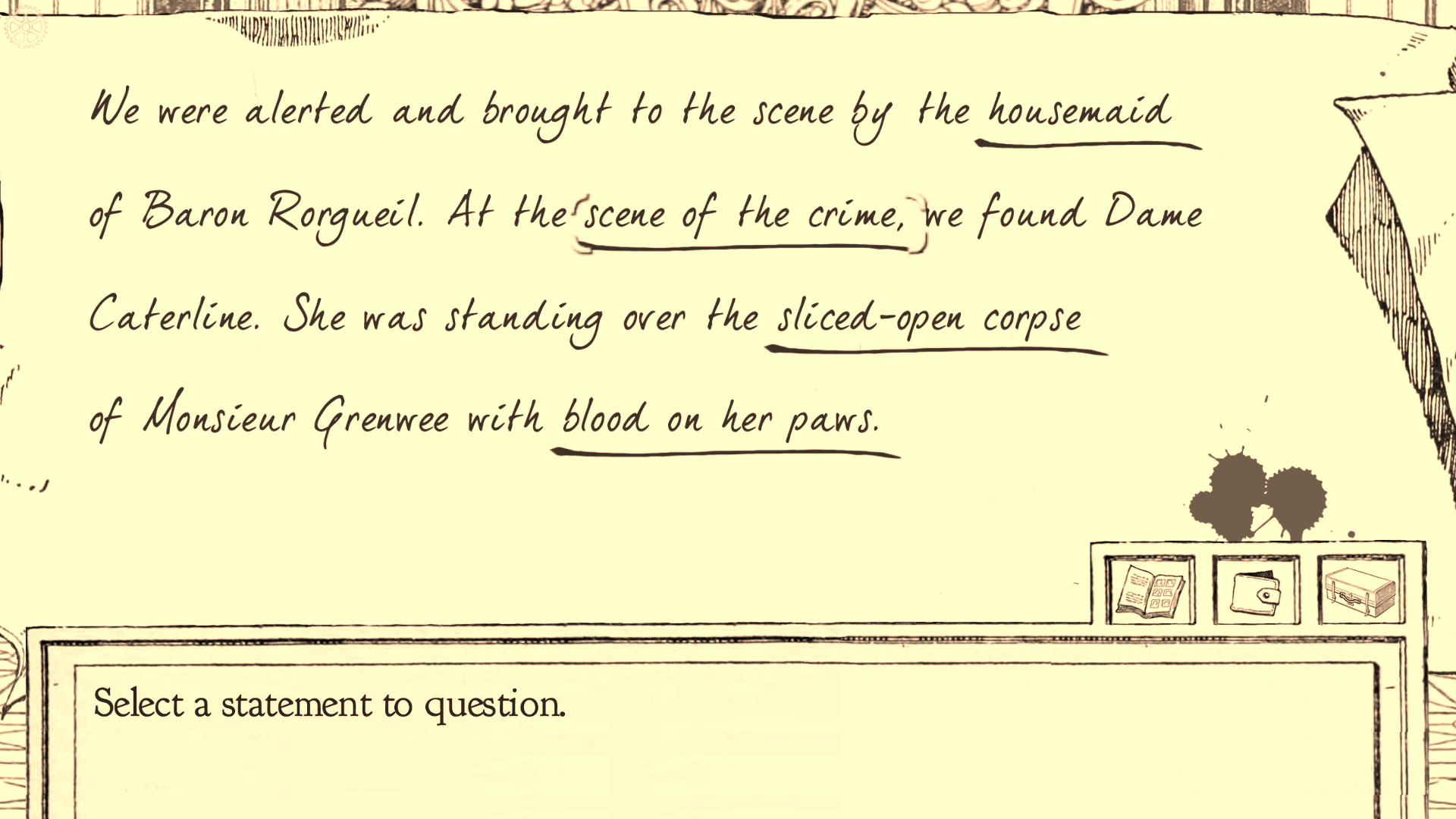
In regards to Aviary Attorney’s graphics and music, which I want to discuss together, this is where things get remarkably indie in every sense of the word. The presentation of the game is unique in that most of it is actually borrowed from other sources. The environment and character designs are mostly straight rips from the caricature cartoons of French illustrator Jean Ignace Isadore Gerard Grandville, while the music has several sources from the public domain but chiefly credits Camille Saint Saens’ Carnival of the Animals. At first blush I definitely saw this as a bit of a cost cutting measure wrapped in the guise of small indie dev auteurism, and while this is probably still partially true I have actually come to be more impressed by it than I thought. This mainly comes down to the fact that both of the chief providers of Aviary Attorney’s art and music lived around the same time period as featured in the game, and therein lies the beauty of it. Those who tell stories set to the historical past and the audiences who listen to them often understand that on some level a certain suspension of disbelief is required to bear the dissonance between our hindsight perspective and the ultimate truth which we might never know. Despite this, seeing the works of art of those who lived through the period gives the game a kind of magic which transcends the script they are playing apart in. Even if the tales of these cartoon birds as presented by Sketchy Logic matches naught of the true history, you can still look at these characters and realize someone who lived long ago really drew these figures as an abstract preservation of what he saw in the world. The music similarly is surprisingly captivating insofar as you might have been able to hear something like it back in those days at a symphony, and after while the presentation just… clicks. Obviously I don’t think I can give the game full marks in either category as I’m sure a more original presentation would have expanded the scope of what the story was able to do, but as is I think they couldn’t have used the copyright-free material more cleverly.
Finally, as for what this game can speak towards the Catholic player’s life, I think it’s surprisingly fitting. While on the surface you might think the farcical elements of the game might keep the game from being especially deep, there’s actually a strong element of exploring how justice ought to manifest in society. Aviary Attorney thinks a lot about the congruence of crimes and punishments, and some of the central figures of the story are quite committed to the sentiment that, given reasonable extenuating circumstances, mercy is utterly preferable to punishment. This can be a rather difficult idea to grapple with in the society of our day where the courts arguably need more courage in enacting proper punishments, but even so I think this tale serves as a great reminder that we aren’t aiming for the polar opposite either. After all, if God can forgive even those sinners who have broken His law quite grievously and intentionally, then it stands to reason that there is justice in showing forgiveness to those who break our own laws due to circumstance. Make no mistake that Aviary Attorney is not saying these things naively, as the A route especially explores the importance and justice of fairly punishing the guilty. But it does encourage us to stop and question what blind and unmerciful adherence to mortal laws actually do for us. Justice will always be a difficult thing for our limited perspectives to see clearly, but imitation of God and the mercy which we desperately seek from Him can go a long way to mending that flawed perspective. Carry your cross not as mere justification for your own right to judge, but as a reminder of the forgiveness you have received and are to show wherever possible. Just… maybe don’t go as far as some of the lengths shown in the game. Mercy is important and all, but lying to help others escape the due process of just laws is a bit beyond the scope of that mission.
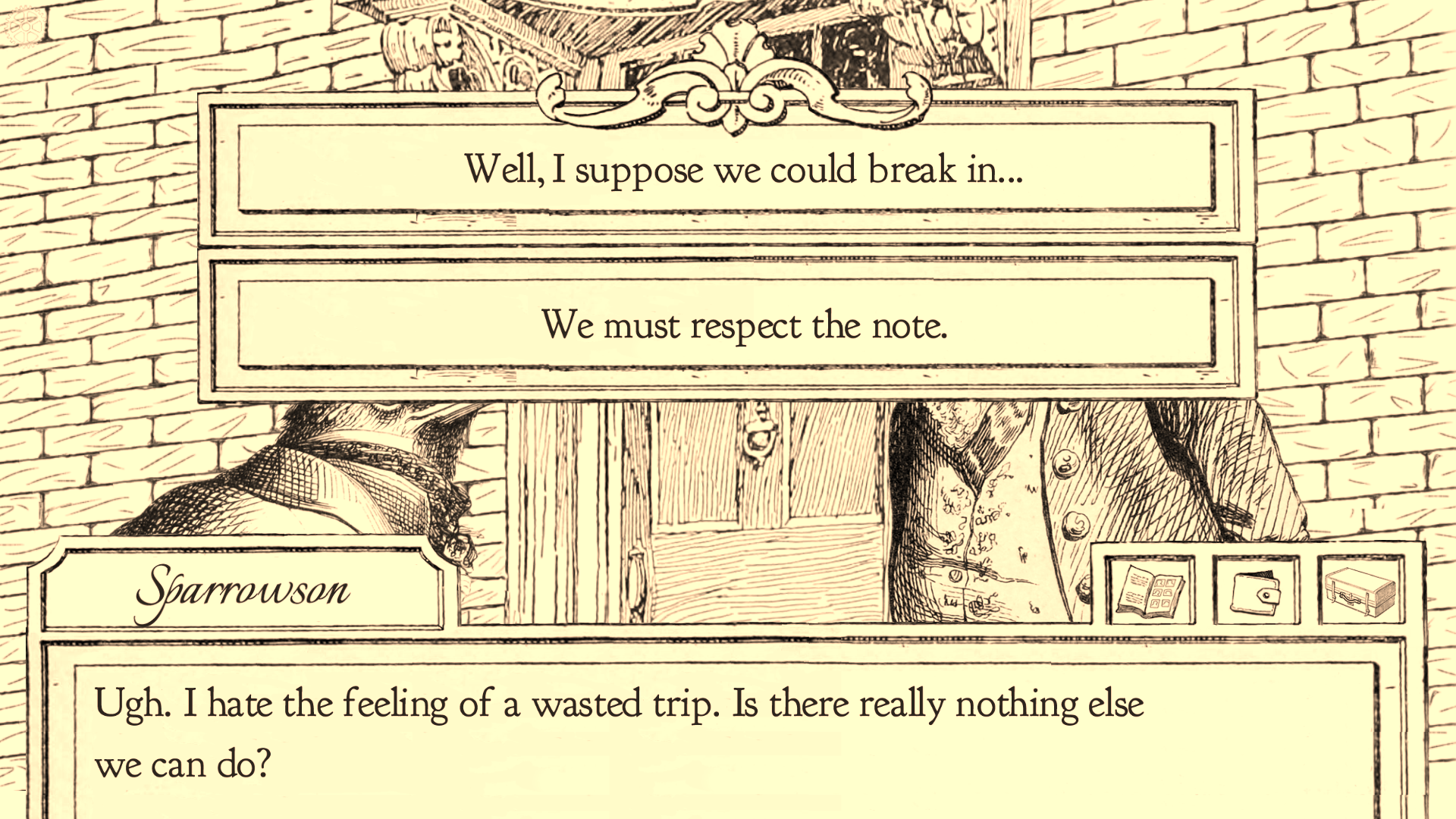
In conclusion, Aviary Attorney was a surprisingly well-constructed visual novel with an exciting story, witty dialogue, and an eclectic but fitting presentation. It may be a little short, and there are a few things that could have made the writing a little tighter, but if you want a to-the-point game that makes fun and meaningful twists on the familiar structure of Phoenix Wright, then you won’t be disappointed. If you’ve been looking for a more casual experience that won’t break the bank, I’d definitely recommend giving this game a shot. This tale of Falcon and Sparrowson soars much higher than its humble appearance suggests, so why not step into the Palais de Justice and set some caged birds free?
Scoring: 68%
Gameplay: 3/5
Story: 5/5
Art and Graphics: 3/5*
Music: 3/5*
Replayability: 3/5
*Though excellently selected, most of the music and graphics are largely lifted from other sources, and as such I’m not especially comfortable awarding them too many points compared to more original efforts. You can imagine these numbers being higher if you want, the math on these scores gets weird most of the time anyways.
Morality/Parental Warnings
Aviary Attorney as a narrative experience finds most if not all of its darker content within specific elements of the story. Despite the comedy, this tale is at its heart trying to tell a story of social decay and revolution, and you can expect such topics to come up often. The bias is generally towards the revolutionaries being in the right, and while I can begrudgingly accept that perspective they do commit wicked deeds in pursuit of their goals. The various court cases tackled in the story are almost invariably murder, so expect some corpses and bloodstains at times, although the proceedings are softened by the anthropomorphic characters that populate the setting. The most intense section is probably Chapter Three, which involves a rather high-tension trial with palpable killing intent in the air. Foul language and the Lord’s Name in vain shows up at times in the script, and is usually delivered in the French language. Unfortunately any opportunity to include Catholic perspectives in the story are completely squandered by having most characters who come in proximity to the faith mentioning their secular outlooks. The one character actually affiliated with the Church is secretly (or perhaps obviously) a member of the Cult of Reason, a historical atheist movement from the game’s time period which famously fueled many of the worst aspects of the French Revolution, so don’t expect any good natured discussions about France being the First Daughter of the Church. Thankfully the characters who do represent the Cult of Reason are depicted as the most vile people in the game. I suppose not featuring a fair Catholic voice in the story isn’t problematic per se, but given the historical setting and the fact that you literally visit Notre Dame Cathedral I did want to mention it just in case such elements got your hopes up.
